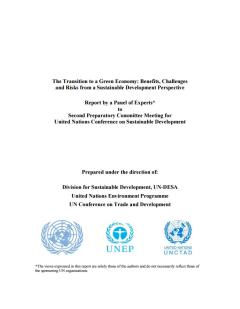
This report comprises a series of three perspectives of the ‘Green Economy’ from leading experts Jose Antonio Ocampo, Aaron Cosbey and Martin Khor and an overarching summary by Jose Antonio Ocampo. The core elements of the paper are:
- The macroeconomics of the green economy. Here, Ocampo introduces the concept of the green economy from the perspective of the UNEP as one that not only improves human well‐being and lessens inequality but also reduces environmental risks and ecological scarcities. He continues by stating that the majority of literature on sustainability and the green economy exist at a microeconomic dimension (externalities, taxes, emissions trading, subsidies and so forth) and that there is a dearth of literature on the green macroeconomy. He asserts that there are four issues that need to be analysed from a macroeconomic perspective: inter‐generational welfare; the effects of environmental spending and protection policies on both aggregate supply and demand; structural change of growth; and global financing for green economic initiatives.
- Trade, sustainable development and a green economy. This paper by Aaron Cosbey explores the potential opportunities and risks of trade, arising in the transition to the green economy. The paper discusses the reasons why a green economy is desirable and how trade policy can ease the transition, the relative positions of trading partners pursuing a green economy, and the role of the international community in ensuring that trade and investment policy contribute to a widespread pursuit of the green economy.
- Challenges of the green economy concept and policies in the context of sustainable development, poverty and equity. In this paper Martin Khor explains that the ‘green economy’ has become a major focal point in discussions around the environmental crisis. He documents the problems associated with defining the concept of a ‘green economy’ as there has not yet been widespread agreement amongst environmentalists or economists on what it should entail. He states that it is an extremely complex concept and as such, it is unlikely there will be international consensus on its meaning and use in the short‐term. However, he does say that a ‘green economy’ should be environmentally friendly, sensitive to the need to conserve natural resources, minimise pollution and emissions that damage the environment and produce products and services which do not harm the environment. Importantly, Khor raises several concerns and risks associated with green economy from the perspective of developing countries, including: that green economy must contribute to rather than replace sustainable development; that countries cannot be treated in the same manner through a “one size fits all” approach; the risk of “green protectionism”.
